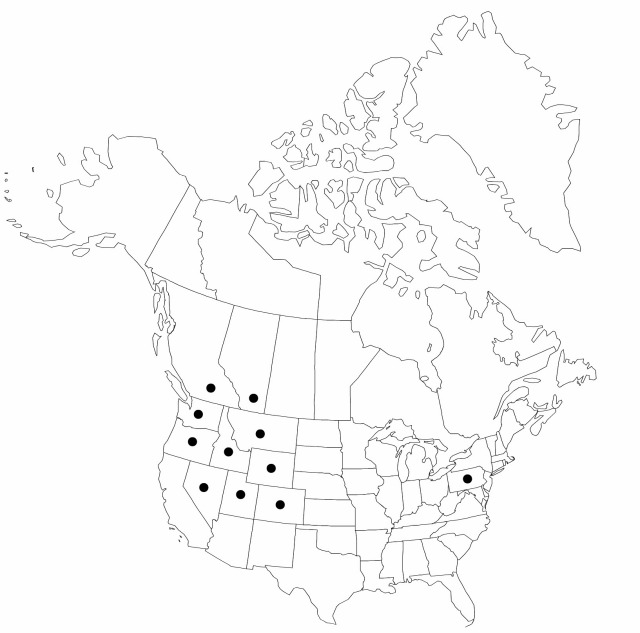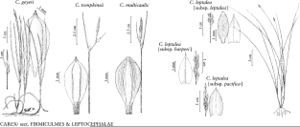Difference between revisions of "Carex geyeri"
Trans. Linn. Soc. London 20: 118. 1846.
FNA>Volume Importer |
FNA>Volume Importer |
||
| Line 24: | Line 24: | ||
|elevation=800–3300 m | |elevation=800–3300 m | ||
|distribution=Alta.;B.C.;Colo.;Idaho;Mont.;Nev.;Oreg.;Pa.;Utah;Wash.;Wyo. | |distribution=Alta.;B.C.;Colo.;Idaho;Mont.;Nev.;Oreg.;Pa.;Utah;Wash.;Wyo. | ||
| − | |discussion=<p>A disjunct population of Carex geyeri is known from Centre County, Pennsylvania, well beyond the normal range of the species in the western mountains. The site should be re-examined to determine whether it persists there and whether it was native or introduced. Carex geyeri is an important native forage species in western montane grasslands (A. Cronquist et al. 1972+, vol. 6).</p> | + | |discussion=<p>A disjunct population of <i>Carex geyeri</i> is known from Centre County, Pennsylvania, well beyond the normal range of the species in the western mountains. The site should be re-examined to determine whether it persists there and whether it was native or introduced. <i>Carex geyeri</i> is an important native forage species in western montane grasslands (A. Cronquist et al. 1972+, vol. 6).</p> |
|tables= | |tables= | ||
|references= | |references= | ||
| Line 48: | Line 48: | ||
|publication year=1846 | |publication year=1846 | ||
|special status= | |special status= | ||
| − | |source xml=https://jpend@bitbucket.org/aafc-mbb/fna-data-curation.git/src/ | + | |source xml=https://jpend@bitbucket.org/aafc-mbb/fna-data-curation.git/src/8f726806613d60c220dc4493de13607dd3150896/coarse_grained_fna_xml/V23/V23_1075.xml |
|genus=Carex | |genus=Carex | ||
|section=Carex sect. Firmiculmes | |section=Carex sect. Firmiculmes | ||
Revision as of 17:05, 18 September 2019
Plants not cespitose, long-rhizomatous. Culms 13–49 cm, triangular, scabrous distally. Leaves: basal sheaths reddish brown to dark brown; blades plane, 1.1–3.5 mm wide, equaling or exceeding culms. Spike with staminate portion separated from pistillate portion by short but conspicuous internode, with pistillate portion unbranched, 7.5–26.5 × 1.3–2.2 mm. Pistillate scales brown, chartaceous, apex cuspidate to short-awned. Staminate scales reddish brown, apex cuspidate to short-awned. Anthers 2.2–6.2 mm. Perigynia 1–3, greenish yellow to brown, with 2 marginal veins, otherwise veinless, 5–6.8(–8.4) × 1.8–2.8 mm.
Phenology: Fruiting late Apr–late Aug.
Habitat: Dry montane and subalpine grasslands, burns, and open spruce, fir, or pine woods
Elevation: 800–3300 m
Distribution

Alta., B.C., Colo., Idaho, Mont., Nev., Oreg., Pa., Utah, Wash., Wyo.
Discussion
A disjunct population of Carex geyeri is known from Centre County, Pennsylvania, well beyond the normal range of the species in the western mountains. The site should be re-examined to determine whether it persists there and whether it was native or introduced. Carex geyeri is an important native forage species in western montane grasslands (A. Cronquist et al. 1972+, vol. 6).
Selected References
None.
